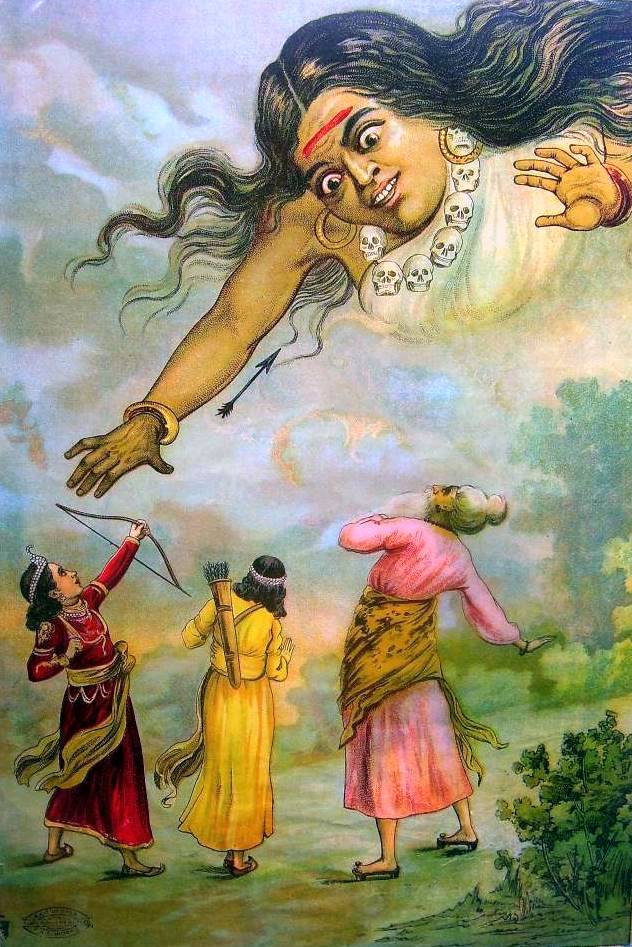Growing up, Thataka knew that she was beautiful. When she came of age, she married Sunda. He was a chieftain that she had previously met. Upon meeting, they had fallen deeply in love, deciding that they would one day get married. Much to their joy, this desire came true. Their union was then further blessed as they had two sons. Thataka's two sons, Mareecha and Subahu, inherited great strength from their mother. As her father was the demigod of valor, strength, and purity, they inherited a great deal of power. Unfortunately, they could not control it.
Though she knew that her sons stood to inherit power from her, Thataka was not expecting the amount that they received. As such, she was not prepared to teach them how to control it. While their powers grew stronger, the boys began to grow arrogant and prideful of their skills. Sunda did not help this, as he thought that they were just acting as boys normally would. In fact, Sunda believed that they were playing much of the time. Because of this, he would often go out and join them in their activities. These ranged from hunting down all creatures in the area, to ripping trees out of the ground in feats of strength.
After a period of time, the saint Agasthya began to take notice of the destruction being enacted by Sunda and his sons. He cursed the person who caused such harm, causing Sunda to immediately die. When Thataka came to rightfully seek vengeance on the person who killed the love of her life, he cursed her and her sons to transform from demigods into demons. Doing this stripped them of their beauty, making their appearances fearful to behold. After this occurred, Thataka was abandoned to her own devices and her sons went to seek other demons. As time passed she grew more and more bitter towards humans. She destroyed the land she dwelt in and killed all who dared to attempt crossing through her territory. It continued in this manner until she was slain by Rama.
(Image of Thataka facing Rama and companions; Image source Wikipedia)
For this story, I chose to retell the story of Thataka by giving more of her background. I thought that she was punished harshly for the actions of her family, and I wanted to make her seem more justified in her response. I felt it was unfair for her to be transformed into what was basically her opposite solely because she grew angry and wanted revenge on the person who killed her husband.
Narayan, R. K. (1972) The Ramayana.

You certainly did a good job inspiring sympathy for Thataka. The gods can be cruel, and it would seem that is especially true in her case. The gods don't have a three strikes rules, apparently--anger them and die. It's kind of a trend throughout ancient mythology. However, like you I think her reaction to the situation was very human, and it's sad that she was punished so harshly.
ReplyDeleteYours is a really neat take on Thataka's story! I enjoyed reading it again and seeing her in an entirely new light. Thataka did get a pretty bad hand dealt to her by the gods (which seems to be how punishment is handed down throughout the Ramayana) and it is easy to understand how the unfairness she received and the anger she had would lead her to become completely lost and turn into a true Asura. You did a nice job on this storytelling!
ReplyDeleteThis comment has been removed by the author.
ReplyDeleteThis comment has been removed by the author.
ReplyDeleteI really like your retelling of this story! I also found Thataka's punishment to be quite harsh. I like how you told this story from a much less one-sided point of view. Narayan's telling of the story was completely one-sided from the point of view of Rama and Vasistha, probably because Rama was supposed to kill her. Her reaction of anger to the death of her husband seemed very natural to me, so I found her punishment, which turned her into the very threat that Agasthya just dealt with from her husband, to be wrong! Anyway, I definitely understand why you chose to retell this story, and I really enjoyed your version!
ReplyDeleteI think you brought something really interesting to your story this week. I love that you added all the background to Thataka’s character. My only wish was that it had not ended so abruptly. “Until she was slain by Rama”? It just doesn’t seem like the right place to end it. Of course, it is your story, but it just seemed off and I would have liked something else. I’m not sure what, though. Sorry!
ReplyDeleteI haven't read a story about Thataka yet and I think this was great! From the way you wrote this I can certainly see why she'd be so angry at the people who come on her land. It wasn't her fault that her sons inherited so much of her and her husband's power. If she believed that her sons were just messing around then how was she supposed to know that they would be killed for their harmless actions? Your story definitely gives the original story a different point of view. Very interesting! Good job.
ReplyDelete